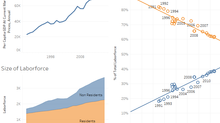The Data Analyst’s Secret Weapon: Why Soft Skills Matter More Than You Think

Most people assume that being a data analyst is all about crunching numbers, mastering SQL, and running complex statistical models. And while those skills are essential, they only get you halfway.
The real game-changer? Soft skills—the ability to communicate, influence, and tell compelling stories with data.
If you look at the Data Analyst Roadmap, it’s easy to get caught up in the technical aspects: SQL (30%), statistics (8%), Python (2%). But here’s what’s surprising—business sense (40%) and communication (20%) take up more space than any single technical skill.

That’s because insights alone don’t drive change. How you present, explain, and frame your findings is what makes the difference.
Soft Skills Are the Hardest to Learn (But the Most Valuable)
Technical skills are straightforward to acquire. You can take a course, watch YouTube tutorials, or practice with real-world datasets, and in a few months, you’ll be proficient in SQL, Python, or statistics.
But soft skills? Those take years of experience, reflection, and practice to master.
🔹 Business Sense (40%) – It’s not enough to analyze data; you need to understand the "so what?" behind the numbers. What does this mean for revenue? How does it impact customer experience? What actions should the business take? Without business acumen, you risk producing insights that are technically correct but practically useless.
🔹 Communication (20%) – Have you ever sat through a presentation where an analyst shared dozens of charts, only to leave everyone confused? Data alone isn’t persuasive—how you communicate it is. Can you explain your findings clearly to executives who don’t speak “data”? Can you simplify complexity without oversimplifying the truth? Strong communicators get their ideas heard.
🔹 Storytelling (10%) – Facts tell, but stories sell. A well-crafted data story makes your insights memorable, actionable, and engaging. Dry reports filled with numbers don’t move people to act, but a compelling narrative can.
🔹 Problem-Solving & Troubleshooting (15%) – Sometimes, the biggest challenge isn’t the analysis itself but knowing what questions to ask. Do you know how to frame a business problem effectively? Can you troubleshoot issues when the data doesn’t make sense? The best analysts aren’t just number crunchers—they’re critical thinkers who can identify patterns and connect the dots.
Soft Skills Set Apart Analysts Who Execute from Those Who Lead
There are two types of analysts:
1️⃣ The Technical Worker – They run reports, answer data requests, and build dashboards. Their work is solid but often overlooked because it’s presented as just another report in the inbox.
2️⃣ The Data Leader – They don’t just provide numbers; they influence decisions. They frame their findings as a story, make a compelling case for action, and help drive business strategy.
Guess which one gets promoted?
The difference isn’t in SQL proficiency—it’s in how well they communicate, persuade, and lead with data.
Why Data Storytelling is No Longer Optional
In a world flooded with data, simply knowing how to analyze it isn’t enough. You need to connect the dots, translate insights into action, and convince stakeholders that your findings matter.
The good news? Storytelling with Data is a skill you can learn. That’s why we’re hosting a Storytelling with Data class designed specifically for analysts who want to move beyond charts and numbers.
📌 If you've ever struggled to get executives to care about your findings...
📌 If your reports get ignored because they’re too technical...
📌 If you want to become the go-to data expert who influences real decisions…
This course is for you. Because at the end of the day, data doesn’t drive decisions—stories do. Are you ready to become a data storyteller?


























Comments